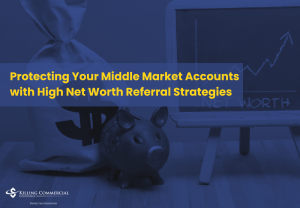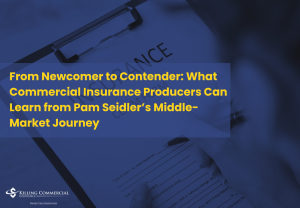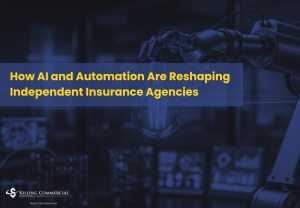Why Most Producers Don’t Fail From Lack of Sales Skill

Let’s set the record straight: most commercial insurance producers don’t fail because they can’t sell. They fail because they don’t plan. They lack process. They don’t follow up consistently—or when they do, it’s weak and generic.
In today’s competitive environment, trust is not built through hard closes. It’s built through consistency. Being present when the incumbent fails. Being available when the buyer is finally ready. Being prepared with insight when everyone else is just pushing a quote.
There’s a major difference between being relentless and being intentional. The former burns bridges. The latter builds them. Follow-up that’s too aggressive erodes trust. But strategic, recurring outreach with value creates credibility and rapport over time.
Redefining the Follow-Up: From “Checking In” to “Delivering Value”
If your follow-up strategy consists of emails that say, “Just circling back to see if you had any questions,” it’s time to reassess. That language screams: “I don’t have anything new to offer, but I hope you forgot to ignore me.”
Follow-up should never be an afterthought. It should be a continuation of the sales conversation—a way to bring new insight, relevant value, or useful reminders into the buyer’s world.
Let’s say you dropped off a mod analysis tool and explained how you could reduce their workers’ comp mod over 12 months. Your follow-up a week later might include:
- A case study of a similar company you helped save $40,000 in mod-driven premium
- A short video explaining deductible credits in general liability
- A custom article you wrote on their industry’s emerging risk trends
- A tool like a claims triage checklist or subcontractor compliance form
This kind of outreach proves you’re watching out for their business—not just chasing a commission. It’s how you position yourself as a risk advisor, not just another quote machine.
How Sales Psychology Impacts Buyer Behavior
Here’s what most insurance producers forget: there is no “Insurance Buying 101” course in high school or college. Most of your prospects are figuring it out as they go, often under pressure or with limited information.
That means they’re more influenced by emotional triggers than you realize. They buy based on fear, trust, confusion, and timing—not just price or coverage.
Your job as a producer is to understand that psychology. When someone says “no,” it doesn’t necessarily mean no forever. It might mean:
- “I don’t understand what you’re offering”
- “Now’s not the right time”
- “I’m afraid to switch because I’ve been burned before”
- “I like my agent and don’t want to hurt the relationship”
If you show up consistently with messages that reduce risk, educate thoughtfully, and show empathy, you’ll be the first person they call when something goes wrong. Because eventually—something will go wrong.
Cadence and Process: The Backbone of a Repeatable Follow-Up System

One of the biggest game-changers in your sales process is having a defined follow-up cadence.
At Florida Risk Partners, our process looks something like this after a marketing drop:
- Day 0: Leave the physical marketing drop with handwritten note
- Day 1: Send personalized email referencing the drop
- Day 2: Follow up with a phone call or voicemail
- Day 4: Share a relevant blog post or case study
- Day 7: Send a custom video message or resource
This 7-day automation repeats every time we enter a new lead into our pipeline. It’s not aggressive—it’s strategic. No pitch-slamming. Just value, education, and presence.
Even if the prospect isn’t ready today, we stay top of mind so when their agent drops the ball—or they get a renewal they don’t like—we’re the natural next step.
How to Use Risk to Drive the Conversation, Not Coverage
Middle market insurance buyers don’t wake up thinking, “Man, I hope someone comes in today and talks to me about my business auto policy.” What keeps them up at night is risk.
And yet, producers constantly lead with coverage and carrier talk, not risk mitigation. This is a mistake.
When you shift the conversation toward how a client experiences and manages risk, you drive value instantly.
Here are three examples:
- General Liability Deductibles: Contractors who self-pay small GL claims are essentially operating with a deductible—but without the credit or loss control support. When you explain that, you immediately position yourself as someone who understands their business, not just their insurance.
- Experience Mod Audits: Most business owners don’t understand the math behind their workers’ comp mod. When you walk them through the factors impacting their score—and show them where their previous broker dropped the ball—it builds instant trust.
- Cyber Liability Framing: Instead of “Do you have cyber?” ask, “What’s your plan when—not if—your business gets hit with a ransomware attack?” That drives urgency without pressure.
When follow-up messages focus on operational risk, not just policy details, you build deeper, more strategic conversations that lead to long-term clients.
Personalization, Messaging, and Trust-Building
In a world where automation rules, personalization is your differentiator.
A templated email with “Dear Business Owner” isn’t going to win business. A message that references their actual operations, claims trends in their vertical, or how their mod compares to industry average—that gets noticed.
Use tools like CRM tags, marketing drop notes, or previous interactions to tailor every message.
Instead of:
“I wanted to follow up on our last conversation…”
Try:
“After our discussion about subcontractor exposure, I pulled together a best practices checklist we’ve used with other landscaping firms to reduce liability—see attached.”
That kind of message says: “I understand you. I care. I’ve thought this through.” That’s how you earn trust and open doors.
What to Do When You Lose the Deal

Most producers ghost a prospect after losing the sale. But top-tier producers lean in.
Follow-up after a loss is one of the most powerful things you can do to earn future business.
Book a meeting—not to resell, but to understand. Ask:
- “What made the difference for you in this decision?”
- “Is there anything I could have done better?”
- “What would have made working with us more comfortable?”
Not only does this give you intel to improve your pitch, it also keeps the door open for future opportunities. One of our longest-tenured clients came from a post-loss lunch. No agenda. Just a conversation. A year later, when their incumbent dropped the ball, we got the call.
Tools and Automation (But Only After You Prove It Works)
There’s no point automating something that doesn’t convert manually.
Start by building your follow-up system on paper or with simple tools like spreadsheets and calendar tasks. Once you’ve proven your messages resonate, you can scale with automation.
Platforms like:
- HubSpot (for sales and marketing sequences)
- AgencyZoom (for insurance-specific workflow automation)
- ChatGPT (for scripting value-focused emails and objection responses)
These tools make it easier to stay top of mind without having to remember every step. But the message still matters. Don’t confuse automation with authenticity—you still need to care about every single touchpoint.
Final Thoughts: The Power of Patient Pressure and Preparedness
In the end, insurance producers who succeed in the middle market don’t do so because they have the lowest quote or slickest pitch. They win because they are present, patient, prepared, and persistent.
They:
- Build follow-up systems that educate, not agitate
- Craft messaging that’s personalized, not generic
- Show up when everyone else disappears
- Focus on risk and relationships more than rate and renewal
And most importantly, they play the long game.
If you’re tired of ghosted leads, stalled quotes, and price shoppers, shift your mindset. Turn your follow-up into a process rooted in strategy, risk awareness, and empathy.
That’s where trust is built. And trust is what closes deals.

From Med Device to Middle Market: Lessons on Sales, Risk Management, and Reinventing Yourself in the Insurance Industry
Reinvention is one of the most powerful themes in the insurance industry. Some of the best commercial producers in the country did not grow up wanting to sell insurance. They did not study risk management in college. They did not come from an agency family. They found this industry after they tried something else. They found it after life pushed them toward a career where performance, autonomy, and mindset determine the outcome.

From Executive Leadership to Field Underwriting: Lessons Producers Can Learn from Aaron Puchbauer’s Transition into Middle-Market Insurance
The most successful producers in the middle market did not get there because they quoted faster, smiled bigger, or knew how to talk longer. They got there because they learned how to differentiate themselves so clearly that prospects had no choice but to see them as trusted advisors. They learned to operate like businesspeople first and insurance technicians second. They learned how to tie operational mechanics to insurance outcomes. They learned how to control their time, their pipeline, and their future.

Protecting Your Middle Market Accounts with High Net Worth Referral Strategies
In commercial insurance, the most dangerous threats to your book of business aren’t always visible on the loss runs. One of the most overlooked vulnerabilities for middle market producers is ignoring the personal lines needs of their business owner and executive clients.

From Newcomer to Contender: What Commercial Insurance Producers Can Learn from Pam Seidler’s Middle-Market Journey
The commercial insurance industry is one of the few professions where someone can enter with no experience, no connections, and no background in risk management and still build a long, lucrative career. But success is never automatic. It requires hunger, humility, curiosity, and the willingness to keep showing up even when the process feels overwhelming. That is why the story of Pam Seidler has already started making waves among new and aspiring commercial producers.

How AI and Automation Are Reshaping Independent Insurance Agencies
In an industry where tradition often outweighs innovation, artificial intelligence and automation are slowly but steadily reshaping how independent insurance agencies operate. The push toward smarter, more efficient workflows is no longer a matter of if—but when. While many agencies are still evaluating how AI fits into their operations, early adopters are already reaping the benefits of streamlined submissions, faster processing, and actionable data insights.

Coaching, Competition, and Consolidation: Inside the Protege Mindset That’s Reshaping the Future of Insurance Producers
The commercial insurance industry is changing faster than ever—and not always for the better. Consolidation is accelerating. Service levels are declining. Private equity is pushing agencies to scale in ways that strip out the personal touch that once defined the independent channel. But for the producers willing to do the work, lean into mentorship, and sharpen their craft, this isn’t a challenge—it’s an opportunity.

Responses